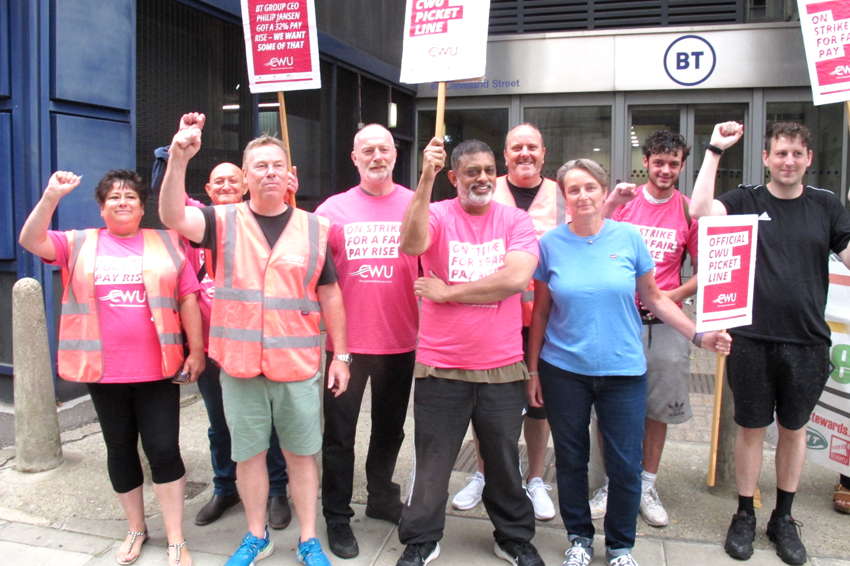
‘I’m 100 per cent for a general strike,’ Communication Workers Union (CWU) Capital Branch Assistant Secretary and BT Tower rep Darren Weller said yesterday morning.
Weller was speaking to News Line on the picket line outside the iconic central London tower as 40,000 BT & Openreach CWU members held the second day of a two-day strike, following last Friday, after voting 95.8% for strike action to win a pay increase in line with inflation.
Weller continued: ‘The cost of living crisis is affecting many households up and down the country. It’s unpalatable. We need to come out and support people from all walks of life now.
‘People’s perceptions of unions are changing. When rail workers are on strike people are supporting them. We’ve had tremendous support on our picket line.
‘The public are now seeing the unions are supporting people, whereas the corporates are supporting their wallets. I don’t think it’s going to be long before there’s a general strike – people will revolt.’
CWU executive member Peter Francis said: ‘We’ve set up our own food banks on picket lines. Our pay is so poor in the call centres, members have to use food banks. At the BT Tower on the picket line I’d like to thank the public for all the food. Last Friday, people were dropping off carrier bags full of food to be distributed to food banks.
‘As far as our strike is concerned, it has been solid. We had a very high turnout on Friday – a fantastic day of solidarity for the strikers.’
Jarrow Labour MP Kate Osborne told News Line: ‘I’m here in solidarity with the CWU workforce in the second national strike in 35 years. BT is a company that turned over £2bn in the last financial year. £750 million of that went to shareholders while BT kept £1.3 billion. This was where the chief executive Philip Jansen gave himself an over 30% pay rise.
‘In the middle of the cost-of-living crisis with workers across the country struggling, they need to do the right thing and give them a decent pay rise.’
CWU member Kevin Meehan said: ‘This strike is about workers making a stand. I support every other strike action.
With inflation so high no-one can cope with it. The binmen in Coventry have been on strike for six months and they’ve won a 12% rise. If it comes to it, we need a general strike. I don’t think much of the Tories or the Labour leader. I’d vote Labour just to get the Tories out but I don’t like Starmer.’
On the picket line at Colombo House in London SE1, CWU rep Brian said: ‘The vast majority of members are behind us. We’ve had years of below-inflation pay rises. This is a very profitable company. All we’re asking for is a fair pay increase to match inflation.
‘There are many colleagues struggling to survive, especially those with young families. Clearly there are bigger price rises coming up, especially food items. I fear for people growing up in this society the way it’s going.’
At Peterborough Rd depot in Fulham, west London, CWU rep Winston Richards said: ‘Our members have not had a pay rise in two years. BT’s profits were £1.3 billion and £713 million was paid to shareholders in dividends. They put up prices 9%, but say we can’t get a pay rise because they can’t afford one. They imposed a pay award rather than negotiate. Everything must be negotiated. The board must not show arrogance but match wages with inflation. We are not backing down.’
On the picket line at Northolt, CWU picket Saqib Butt said: ‘I was down supporting the Aslef strike at Willesden Junction on Saturday and it was really busy with lots of strikers and supporters all day. We went to show solidarity. We know what they’re going through. Other unions are talking about a general strike. Everyone is feeling the pinch. We’re seeing astronomical gas and electric price rises and we’re expected to live on the same.’
CWU picket Dave Saunders said: ‘Good for these Labour MPs for joining our picket lines. We’ve got a foodbank in one of our call centres because our pay is so poor.’